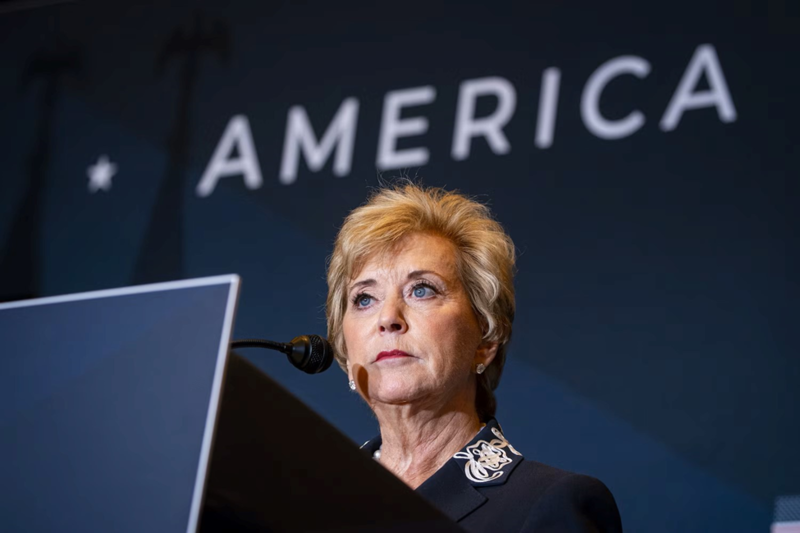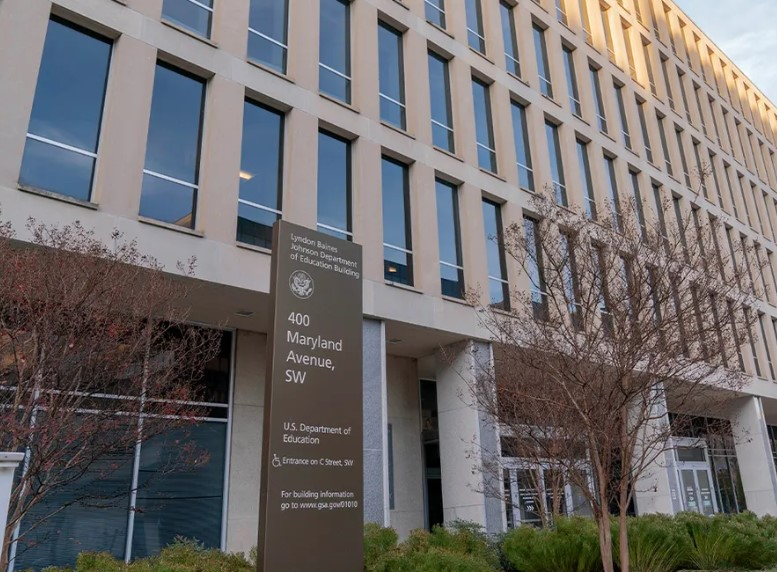Linda McMahon auditions to lead Education Department Trump wants to eliminate
Input
Modified
President Donald Trump has nominated former WWE executive and Small Business Administration director Linda McMahon as his nominee for Secretary of Education. As Trump and his administration continue their efforts to completely demolish the Department of Education, her nomination coincides with a period of major upheaval in the American educational system. In her testimony, McMahon discussed her nomination with the Senate Health, Education, Labor, and Pensions (HELP) Committee. She has been a longstanding supporter and close ally of Trump, and she has promised to carry out the administration's education plan, which includes expanding school choice programs, reducing federal monitoring, and giving states more authority. Her inexperience with education policy, however, has alarmed politicians and educators alike, who doubt her capacity to successfully run such a vital federal department.

The Department of Education has long been criticized by Trump, who has called it a "con job" and said he would rather see it shut down completely. Executive orders, policy changes, and budget cuts are just a few of the actions his administration has done to weaken the agency. Budget cuts, the termination of research contracts, and the transfer of duties to other government agencies have all been made possible by the establishment of the Department of Government Efficiency (DOGE), which was spearheaded by tech entrepreneur Elon Musk. Important education research initiatives have been essentially put on hold as a result of DOGE canceling 89 contracts totaling $881 million inside the Institute of Education Sciences. The administration has also cut $101 million in funding for education programs devoted to diversity, equity, and inclusion (DEI). According to reports, DOGE employees obtained millions of students' private and financial information, raising ethical and legal questions about data security and privacy.
Trump's plan has received broad backing from Republican lawmakers who contend that state and local governments, not the federal government, should be in charge of education policy. House Speaker Mike Johnson, who supports school choice and greater parental authority, has called for the department's dissolution. They contend that giving states more control over education will increase competition and raise academic achievement. Critics worry that in the absence of federal supervision, gaps in funding and educational quality would increase, depriving low-income kids of chances and resources. However, civil rights organizations, educators, and Democratic leaders have denounced the action, stating that it would unfairly hurt kids who are low-income, have disabilities, or are dependent on federal student aid. Major teachers' unions have joined Senator Bernie Sanders in protesting McMahon's candidacy and the department's overall destruction. Senators Andy Kim and Elizabeth Warren have openly attacked the administration's lack of transparency and questioned McMahon's qualifications. Citing the department's responsibilities for paying special education services, enforcing anti-discrimination laws, and administering Pell Grants, Representative Jahana Hayes has sponsored legislation to safeguard it.
There would likely be serious repercussions if the Department of Education is abolished or severely weakened. With less government monitoring, Title I funding—which helps schools in low-income communities—could be transformed into block grants, possibly depleting resources for millions of students. According to the Center for American Progress, 2.8 million pupils in impoverished communities would be impacted by the loss of 180,000 teaching posts. The $15 billion in financing from the Individuals with Disabilities Education Act (IDEA) might be transferred to another federal agency, which would mean less money for special education programs and less protection for students with disabilities. Federal supervision of school discrimination lawsuits may be reduced if the Office for Civil Rights (OCR) is transferred from the Department of Education to the Department of Justice. This could increase inequality in the educational system by making it more difficult for students to report discrimination on the basis of gender, race, and disability. Furthermore, students in underserved neighborhoods would encounter more obstacles to obtaining a top-notch education as a result of the possible lack of federal monitoring, which would exacerbate already-existing socioeconomic inequalities.
Additionally, the Education Department oversees Pell Grants and federal student loans, which enable millions of students to afford higher education. The privatization or downsizing of federal loan programs could result in higher tuition costs and fewer affordable options for students, as 30% of college students in the United States rely on these programs. Higher education may become even less accessible to low-income students if federal subsidies and loan forgiveness programs are reduced or canceled, which would further solidify economic inequality in the nation. Financial instability may also affect universities and colleges that rely on federal financing, which could result in higher tuition and fewer options for student support services.

The public is generally opposed to eliminating the Department of Education, even though Republicans embrace the idea. More than 60% of Americans are against the department's closure, according to a recent Wall Street Journal poll. To guarantee that every child has access to a high-quality education, families and educators contend that public schools require more funding, not less. Without federal norms, many parents and educators worry that educational standards would become inconsistent, resulting in inadequate education for pupils in certain states. National Education Association (NEA) President Becky Pringle has referred to Trump's moves as "an abandonment of our nation’s commitment to equal educational opportunity," promising that supporters and educators will keep up their struggle to keep federal education programs intact. She underlined how important the Department of Education is to upholding equity and making sure kids have the help they require to thrive.

Linda McMahon's nomination as Secretary of Education marks a significant milestone in the Trump administration's efforts to abolish the Department of Education. Opponents warn of disastrous repercussions for public schools, students with disabilities, and college affordability, while her defenders contend that the action will offer states greater authority. The department's future is still unclear due to legal issues, congressional conflicts, and mounting public opposition. The upcoming months will determine whether Trump's school reform succeeds or faces insurmountable resistance. As McMahon negotiates the difficult terrain of carrying out Trump's divisive education plans, she will be under tremendous pressure from both political supporters and detractors if she is confirmed. The continuous discussion concerning the future of the Department of Education raises more general issues regarding the function of federal supervision in guaranteeing fair educational opportunities for all American kids.





















